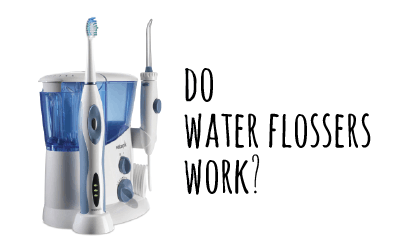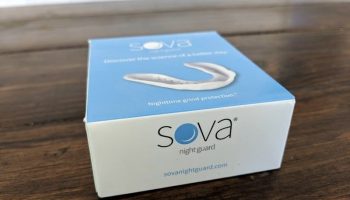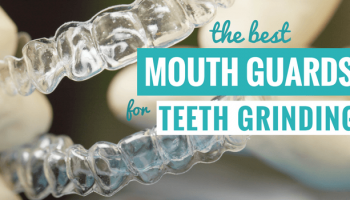Many individuals looking to keep their pearly whites shiny wonder about water flossers. Do water flossers work? What do they do? Are they better than using string floss?
Don’t worry, we’re answering all your questions in this article. Let’s get started.
Do Water Flossers Work? They Sure Do!
Water flossers aren’t just some marketing gimmick – they really are useful little tools.
First, lets talk about exactly what water flossers do, and what they don’t do.
Water flossers (such as Waterpik) shoot a small, high-pressure stream of water that can be used to dislodge food particles stuck between teeth and rinse bacteria off of teeth.
What most people want to know is – do water flossers remove plaque and protect teeth as effectively as string floss?
Unfortunately, research varies on the subject. Some studies have shown water flossers to be very effective at removing biofilm, a tough coating of plaque that is hard to strip away and can cause tooth decay.
While some studies call out water flossers as even more effective at removing biofilm than string loss, other studies claim that string floss wins, since its scraping motion is thought to be more powerful than the water flosser’s rinsing.
While the issue of plaque is still up for debate, in other areas the water flosser clearly wins.
- Using a water flosser was shown to be 93% more effective at reducing bleeding than manual flossing (according to a 2007 Barnes study).
- Water flossers were also reported to be 52% better at reducing gingivitis than manual flossing.
When Water Flossers Win
Although the ball is still up in the air when it comes to water flossers vs string floss for removing plaque, there are some situations in which water flossers are much preferred over string floss.
Some cases in which water flossers may be preferred include:
- Individuals who have braces. Water flossers are extremely effective for people with braces, since water flossers can remove food particles and bacteria from braces where string floss normally cannot reach.
- Individuals with poor dexterity. Flossing can be physically difficult for individuals who do not have great dexterity. For them, water flossers are much more preferable.
- Individuals with sensitive gums. If you have sensitive gums and bleed when using string floss, water flossers are much more gentle and a great alternative.
There have also been studies showing that, in general, many individuals enjoy using a water flosser over manual floss. In addition to water flossers, there are also air flossers, that work similar to water flossers, but use blasts of air instead of water (see our comparison of water flossers vs air flosser for more info).
Manual flossing isn’t incredibly popular. In fact, only 14% of Americans say that they floss daily. Flossing is extremely important to dental care, resulting in fewer cavities and less gum disease.
If you aren’t going to do manual flossing, definitely go ahead and pick up a water flosser if you’ll be more likely to floss with it.





First I have to say I have always been a finatic about oralfe hygiene. I cauldron never stand the taste of a dirty mouth, and at 70, it’s flourno different. When I was a kid, we lived in a small town where dental care was somewhat archaic. Our regimen was Crest or Colgate with a manual brush and suffering through old fashioned floride treatments From fourth to sixth grade. They used clamps with pads that were clamped to the teeth soaked with a flouride solution with the clamps staying in place for an hour. It was not a pleasant experience.
However it must have done some good because at seventy, I still have all my teeth; except for one which which had been broken and crowned.
After starting regular dental visits at George to
Great read! I might be purchasing a water flosser for my children soon, it seems like an effective device that will encourage children to look after their teeth.
Good to get them in the habit early!
It’s been just over a year since i started using a water flosser. I have periodontitis and three deep pockets. Flossing and brushing alone could not stop my gums bleeding so after having had a deep cleaning i bought a water flosser. My gums never bled again and my dentist confirmed that i didnt need to see the hygienist as there was nothing there to clean. Very happy with it, worth every penny.
Great to hear that!
i floss every day with water flosser but only flossed once week before or less so even if it isn’t as good as regular flosser – its still better as i floss a lot more .. hope that makes sense
I tried a waterpik brand flosser and didn’t like it. First, I got a “shower” when I used it the first time. The second time I was able to control the water flow a little better with a different tip but it generated so much water that I thought I’d gag. After this experience, I’ve gone back to traditional string floss.